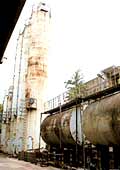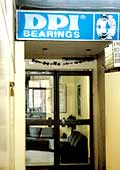|
SKF
Bearings, bag bearings, Timken India and NRB Bearings are some
of the respectable names in the Indian bearings industry with
significant sales (SKF Bearings: Rs 579 crore last year), and
handsome double-digit growth (triple digits in the case of NRB
Bearings)... And then you have Deccan Bearings, which isn't the
most apt of names for this Mumbai-based company-it doesn't make
bearings any more. In fact, Deccan Bearings doesn't make anything
any more. Ensconced in his second-floor office in one of the century-old
buildings in the narrow bylanes of Mumbai's Fort area, Pilaji
Parab, Compliance Officer at this Rs 10.5-crore firm, explains:
"After the closure of our manufacturing unit in Halol, we
are only trading in bearings in the domestic market, which mainly
caters to the northern part of India. And the Mumbai office is
only for paperwork and settling bills. We have no idea if the
company will again start its manufacturing facilities."
Deccan Bearings has its registered headquarters
in a corner-office on the second floor of a century-old edifice
that still stands in one of the narrow bylanes of Mumbai's bustling
Fort area. Step into the dull blue-coloured room, and you're greeted
by an office boy sitting at the reception and a sprinkling of
staff going about its work. To be sure, there are hundreds of
such holes-in-the wall-type of offices in the Fort area, but none
could boast the kind of numbers Deccan Bearings has thrown up:
A net profit of all of Rs 1 lakh for 2005, and a price/earnings
(P/E) ratio of over 1,000 times to boot! Which, in other words,
means there are investors out there who would be willing to pay
Rs 1,000 for a share of the venerable Deccan Bearings for every
glorious rupee of earnings it generates.
Now you'd be delusional to expect such gung-ho
growth from any company in the world, but you'd be downright silly
to see even an iota of that kind of potential from Deccan Bearings.
Reasons? Its manufacturing unit at Halol in Gujarat has been shut
for five years. It sources its bearing from suppliers in Rajkot
and distributes to its dealers, who cater to the unorganised market.
The company also exports bearings to Dubai, where it does not
have any fixed buyer. It sells the bearings to a firm that belongs
to a relative of the promoter, according to a company official.
 |
 |
| Royal Cushion Vinyl Products: Still hopeful
of a revival? |
Deccan Bearings: Doesn't make bearings
any more, no plans either |
| ROYAL CUSHION VINYL PRODUCTS |
DECCAN BEARINGS |
| NATURE OF BUSINESS: Maker of vinyl floorings
BOTTOM LINE TREND: Three years of losses, company
now at the BIFR
SHARE PRICE APPRECIATION: From Rs 6 in May 2004
to Rs 52 last fortnight
COMPANY SOUNDBYTE: Some players are speculating
that the company will come out of the BIFR
|
NATURE OF BUSINESS: Trading in bearings
BOTTOM LINE TREND: Falling profits for three years,
from Rs 18 lakh to Rs 1 lakh last year
SHARE PRICE APPRECIATION: From Rs 50.25 in September
2003 to Rs 82, resulting in a P/E of over 1,000 per cent
COMPANY SOUNDBYTE: We have no idea if the company
will recommence manufacturing operations
|
Deccan Bearings-Net profits for the past three
years: Rs 1 lakh, Rs 7 lakh, and Rs 18 lakh, respectively. P/E
last fortnight: 1,171.
Welcome to the wild and absurd universe of
penny stocks, where four-figure P/Es and appreciations in stock
price of similar giddy nature don't really elicit emotions of
shock or wonder. Yes, there may be a few gems out there, but of
the thousands of micro-cap stocks out there (which typically are
stocks in the Re 1-Rs 20 range and found mostly in BSE's Z, S
and B2 groups), there's little doubt about the fundamental quality
of these scrips. "If you think there are pockets of froth
amongst the mid-caps, in penny stocks it's all froth," points
out Nirav Sheth, Head (PMS), BRICS Securities.
Let not the scandalous movements of this
dubious pack make you suspect the robustness of the ongoing bull
run, which is still being driven by quality earnings and realistic
valuations (the Sensex P/E is still in the 16 region). Yet, every
stock market rally, anywhere in the world, inevitably results
in the stragglers and fraudsters also joining the party. The biggest
attraction of penny stocks is the prospect of quick, fanciful
returns, sometimes triggered by the prospect of a turnaround but
often fuelled by promoters dabbling in their own stock. And it's
not just the common investor who's lured towards these cats and
dogs-a number of foreign institutional investors (FIIs) too have
taken a shine to them (see The Froth FIIs Fancy). The risk of
course is huge, with these stocks tending to eventually drop even
faster than they'd risen. Last fortnight, for instance, when the
markets turned volatile and the Sensex lost 265.5 points on a
single day, the small-cap index fell the hardest, by 460.32 points.
In fact, some 1,724 penny stocks witnessed depreciation in the
September 21-29 period. Close to 30 stocks couldn't find any takers
and were not traded at all. With market watchdog Sebi suspending
the promoters and directors of two small-caps-IFSL and Minal Engineering-for
trading in their respective stocks, penny punters had decided
to call it a day. At least for now.
Yet, Sebi's action against a few suspect
promoters may be a case of too little, too late. For, as BT found
out, there are many more penny stocks displaying highly irregular
trading patterns ever since the current bull run began in mid-2003,
with the dubious activity peaking along with the market's new
highs. In fact, when the Sensex was around 2,960 levels in April
2003, a little over 90 per cent of the BSE's turnover was in the
A group of companies. By the time the 30-share index hit 8,000,
that figure had come down to 59 per cent. The total number of
companies traded too has increased in this period, from 1,330
in April 2003 two years ago to 2,668 when the index touched 8,000.
And, as BT also find out, a number of the penny stocks that have
displayed mind-boggling appreciations of 1,000 per cent-plus over
the past couple of years-even as the BSE 500 and the BSE 200 have
gained just 214 per cent and 192 per cent between March 2003 and
September 2005-are actually loss-making, many of them for three
years at a stretch. There are plenty of those in the black that
enjoy P/Es in the 500-1,000 per cent, despite a consistent trend
of declining profitability.
 |
 |
| Polar Pharma's Ghatak: Accumulated losses
are down |
Vista Pharmaceuticals: Settled its dues
with IDBI |
| POLAR PHARMA |
VISTA PHARMACEUTICALS |
| NATURE OF BUSINESS: Condom manufacturing
BOTTOM LINE TREND: Two years of losses, accumulated
losses of Rs 9 crore
SHARE PRICE APPRECIATION: From Rs 2.60 in April
2003 to Rs 66 last fortnight
COMPANY SOUNDBYTE: We will break even next fiscal,
earn our maiden profit in the year after that and eventually
emerge as a global prophylactic leader
|
NATURE OF BUSINESS: 100 per cent EOU
engaged in manufacture of drug formulations
ACCUMULATED LOSSES: More than 50 per cent of its
net worth. But now, the company has reached a one time settlement
proposal for Rs 30 million (Rs 3 crore) of its total dues
of Rs 16 crore
SHARE PRICE APPRECIATION: From Rs 1.25 in April
2003 to Rs 19 last fortnight
COMPANY SOUNDBYTE: We have no control on how the
market behaves
|
Consider Royal Cushion Vinyl Products, formerly
National Leather Cloth Manufacturing Co., a sick company with
piled up losses of over Rs 100 crore in the past three years.
A case with the Board for Industrial & Financial Reconstruction
(BIFR) for five years now, Royal Cushion is hopeful of a revival
scheme, although no ray of hope is visible in the near term. As
of March 2005, the company was saddled with interest charges of
Rs 33 crore. Now brace yourself for this: The stock price has
rocketed 10-fold in the past 15 months, from a low of Rs 6.25
in May 2004 to Rs 66.5 in August 2005. Current price: Rs 38.80.
How does Royal Cushion justify this spurt? Well, it doesn't. It
can't. Says Kailash Sharma, Compliance Officer, Royal Cushion
Vinyl: "We are also surprised with the sharp surge in stock
price of the company. I understand in the bull market some players
are speculating that the company will come out of BIFR. Our huge
interest burden has been the key reason for the poor financial
performance, as the turnover of the company is growing."
The promoters for their part aren't exactly
ruing their misfortune. Between December 2004 and June 2005, they
offloaded 4.46 lakh shares on the domestic bourses. In the same
period, the Royal Cushion stock price surged from a low of Rs
13 to Rs 35.50, a rise of 173 per cent, even as the promoter holding
inched downwards from 64.08 per cent in December (or 77.32 lakh
shares) to 60.38 per cent by June (72.86 lakh shares).
Royal Cushion isn't the only consistently-loss-making
company whose stock is galloping. Consider the intriguing case
of the fascinatingly christened Consortex Karl Deolitzsch, once
upon a time more humbly known as AP Power Tools. Despite three
years of successive losses, the Consortex stock has galloped smartly,
from a low of Rs 0.35 in March 2003 to Rs 10.25 in September 2005.
When BT attempted to locate the headquarters of the Hyderabad-based
company, going by the address on the BSE website, it succeeded
in finding the home of the company's promoter, M. Sudhakar Rao.
The company is registered in Hindupur (some 700 km from Hyderabad),
we're told. Rao, apparently a science graduate in agriculture,
wasn't available for comment, as he wasn't in the city. The company's
operations are believed to be shut down, but nobody is sure. Nobody
is sure either about the status of its tie-up with a German company.
The Andhra Pradesh Industrial Development Corp. (APIDC), which
has invested Rs 80 lakh in the company, it would appear has little
faith in the company, going from what an APIDC official told BT.
"For APIDC it has been an equity investment and investment
in equity is always risky!" Meantime last fortnight, Sebi
got into the act, and banned Rao and four other directors of Consortex
from the capital markets for allegedly issuing 15.62 lakh fake
shares.
| HOW TO IDENTIFY TAINTED PENNY STOCKS |
»
Look at the earnings record: If there's a two-year
loss-making trend, or a three-year trend of declining profitability,
and yet the stock shows appreciation higher than the benchmark
indices, something's amiss
» Trading
patterns are erratic: It isn't unusual to discover that many
of these stocks would have been traded just once a year, or
to find a sudden burst of activity which is followed by a
prolonged period of no trading
» Promoters'
holdings are high: Up to 90 per cent in a few cases, which
leaves a very low floating stock in the market, which in turn
makes manipulation elementary
» They
inevitably have been rechristened at some point in time: Consortex
Karl Doelitzsch was once AP Power Tools, Royal Cushion Vinyl
Products was once National Leather Cloth Manufacturing Co,
Marathon Nextgen Realty & Textiles was once Piramal Spinning
& Weaving...you get the picture
» Check
the operations: Production would have stopped, and the company
may be just a trader (in some cases of its own stock too!)
|
If investors should be cautious about companies
with a track record of losses, they should be even more alert
when it comes to stocks with erratic trading patterns. Consider
Marathon Nextgen Realty & Textiles (formerly Piramal Spinning
& Weaving Mills), a company that's riding on the boom in property
prices. In a little under 18 months, the stock zoomed 50-fold
to Rs 248.85 on August 31, from just Rs 5 on March 5, 2004 (the
stock hasn't been traded since August 31). Financials are nothing
to write home about, with the company ending 2004-05 with a Rs
31-lakh loss, as compared to a net profit of Rs 21 crore in the
previous year (in 2002-03, the company was in the red to the tune
of Rs 7 crore). Company managers, though, have a good reason for
the surge in the stock price. Says Nilesh Dand, Finance Manager,
Marathon Nextgen: "The surge in real estate price and our
ongoing real estate development and construction activity has
generated interest in our stock. A lack of floating stock coupled
with demand for shares has pushed the stock price higher."
Dand may have a point there, but the area
of concern isn't so much the justification for the stock price
surge but the manner in which it has spurted. In all of 2005 till
date, the stock has witnessed just 46 trades, 19 of which were
executed on May 25 at a price of Rs 118.80, which is 20 per cent
higher than the previous close of Rs 99-which was way back on
July 21, 2004! From thereon, the stock has been hitting the circuit
filters, with just 50 shares changing hands in every trade.
Deccan Bearings too has a history of erratic
trading. Prior to 2005, the stock was last traded on 2003. On
September 30, 2003, it closed at Rs 65.25, after witnessing 38
trades on the counter. Only 2,000 shares changed hands on the
BSE. Thereafter the stock got traded only on February 16, 2005.
Between February 16 and 28, 2005, the stock within commencement
of trades was locked at the upper circuit. In this period, the
price rose from Rs 78.30 to Rs 190.33, with only 142 shares being
traded on the counter.
Marathon Nextgen isn't the only stock that's
riding on the bull run in real estate. There's Modern India, a
company that says it will be developing some 2 lakh square feet
of mill land in south and central Mumbai. The company has been
in the red for two years now, and its Company Secretary &
Legal Executive says: "Although our new ventures are showing
signs of good growth, it's difficult to say as to when the performance
of the new businesses will be reflected on the balance sheet,
as the losses from the previous businesses (mainly from the machinery
of its textile business) will be carried forward for at least
three more years." That, though, hasn't prevented the stock
from skyrocketing nearly 1,400 per cent, from Rs 10 levels in
mid-April 2004 to Rs 152 last fortnight. Punters, it would appear,
are taking a call based on the huge tract of mill land the company
is sitting on. However, development of Mumbai mill land is still
an uncertain matter, which is still in court.
THE MID-CAP MANIA
They aren't dubious like penny
stocks, but the motley mid-cap bunch may have pockets of stretched
valuations. |
 |
| Financial Technologies' Neralla:
Bulish on the company's future |
The small-cap arena may be littered
with far-fetched valuations and over-the-top price appreciation,
but the mid-cap space too has its share of mind-bogglers.
Consider: Galaxy Entertainment, the stock price of the company
has surged by 1,846 per cent to Rs 340.60 in September 2005
from Rs 17.5 in March 2003. P/E: 643 times. The stock prices
of Natco Pharma and Kale Consultant have risen by 361 per
cent and 380 per cent from their lows in March 2003. Whilst
most of the mid-caps that boast steep P/E ratios have a story
to tell-many of them in sunrise sectors--there are several
ifs and buts that threaten to make the valuations look silly
a couple of years down the line if the growth expectations
don't pan out.
Take Financial Technologies (FT), a stock that has soared
13,400 per cent in the past two years. P/E: 582. Last fortnight
the stock was quoting in the Rs 1,315 range. For the year
ended March 2005, FT's net profit fell to Rs 9.91 crore
from Rs 12.74 crore in the previous year. On consolidated
earnings of Rs 20.24 crore (including subsidiaries MCX and
IBS Forex), FT's P/E is still 276. Foreign institutions
like Fidelity, T. Rowe Price and Goldman Sachs, along with
Reliance Capital, have great expectations from FT-they've
cornered 1.26 per cent, 5.68 per cent, 1.14 per cent, and
3.98 per cent, respectively, of FT stock. Says Devang Neralla,
Director, FT: "We are setting up businesses that will
drive the future of our company."
FT sees huge potential in the Multi-commodity exchange
(MCX), in which it holds 65 per cent of the equity, and
a venture with the Dubai Gold & Commodity Exchange (DGCX)
is slated to begin in November. A new spot market for commodity
trading is also in the works as is a bulk warehouse. It's
on the back of such forays that FT is projecting an over
10-fold increase in net profits for the current year, to
Rs 220 crore, which will rein in its P/E into a more realistic
range of 26.32. Yet, what if volumes in commodity trading
dip? What if competing exchanges come up-as is expected
in Dubai? That's the nature of many mid-cap valuations today:
Huge potential, but then the uncertainty factor isn't negligible
either.
|
Modern India may well be a genuine case of
investors riding on expectations of a turnaround courtesy the
real estate business, but the danger of such steep appreciation
as witnessed in this stock is that a sudden turnabout in market
sentiment can leave investors up the creek. Last fortnight, for
instance, Modern slumped to Rs 112 after "Terrible Thursday".
What's more, typically, after a sudden bout of panic, penny stocks
are shunned and activity in them abruptly comes to a halt, as
there are no buyers but only anxious sellers desperate to bail
out.
Doubtless, there are head honchos who genuinely
believe in a turnaround of their companies, and much of buying
may be triggered by such prospects. Take, for instance, Polar
Pharma, a manufacturer of condoms, whose stock price has gone
up from Rs 2.60 to Rs 66. Says ceo Prabir Ghatak: "True,
we have been incurring losses over the years. But the positive
thing is that our accumulated loss has come down from Rs 35 crore
three years ago to Rs 9 crore. Around February 2005, we got a
major order from Brazil... Since then the stock has taken off."
Then there's Vista Pharmaceuticals, tucked away in Ameerpet in
Hyderabad. Promoted by a New Jersey-based NRI, Dhananjaya Alli,
Vista has accumulated losses that are over 50 per cent of its
net worth. The stock meantime has appreciated 2,682 per cent to
Rs 23.65 between March 2003 and September 2005. One possible reason
for this bullishness, according to local brokers, is that IDBI
has accepted a one-time settlement proposal for Rs 3 crore for
settlement of total dues of Rs 16.4 crore. There's still a long
way to go for Vista, you would say, but that's the nature of penny
stock punters: Hang on for dear life to every shred of good news-which
more often than not are baseless rumours-and ride out the boom.
It's often a rough ride, as investors who lost their shirt in
last fortnight's small cap-collapse will vouch for. After all,
investing in penny stocks is as much a gamble as a spin of the
roulette wheel: The longer you play it, the more certain you are
of losing.
-additional reporting by E. Kumar
Sharma in Hyderabad, Kumarkaushalam in Delhi and
Ritwik Mukherjee in Kolkata
|










